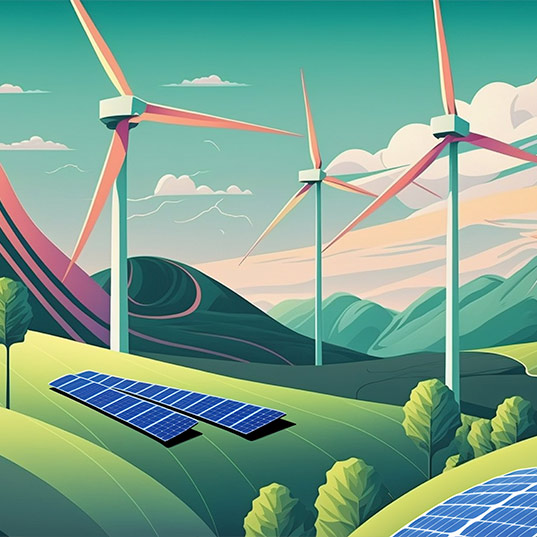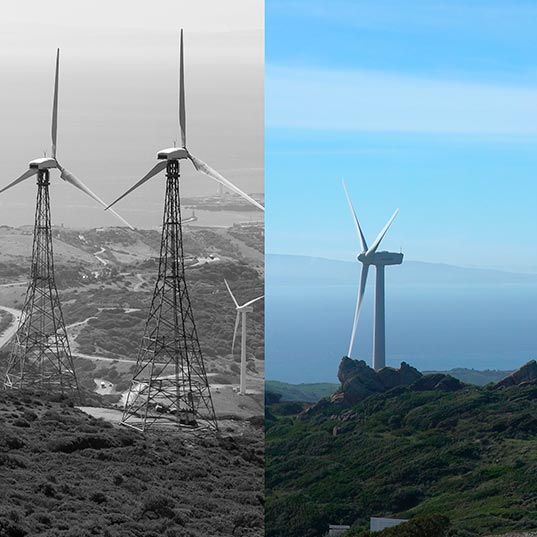Is the world ready for a 100 % renewable energy model?
We are convinced that the transition to a renewable energy model is the only way forward if we want to maintain life on the planet as we know itA world that runs only on renewable energy. Can you imagine it? Do you think it's just a utopia? We believe this will be a reality sooner rather than later. Yes, we are optimists. But we are convinced that the transition to a renewable energy model is the only way forward if we want to maintain life on the planet as we know it.
We have already talked on previous occasions about the need for a change of energy model. This time, we want to present the plans that are currently being implemented and the challenges that must be overcome in order to achieve this. Is the world ready for a 100 % renewable energy model? Let's take a look.
Can we get all our energy from renewable sources?
The short answer is yes, but it depends on the country you’re in when you read this article. If you’re reading it based in Spain, for example, the news could not be more positive. Recently, researchers Javier Samanes and Julio Pascual carried out a study in which they basically concluded that by relying solely on solar photovoltaic and wind technology, Spain would be able to supply 100 % of its electricity consumption.
 In fact, electricity production from renewable sources in this country is on the right track. In July 2020, renewable energy became the energy source with the highest installed capacity. The growth has been spectacular, with 40 % of demand now covered. By 2025, 50 % of electricity generation in Spain is expected to be renewable.
In fact, electricity production from renewable sources in this country is on the right track. In July 2020, renewable energy became the energy source with the highest installed capacity. The growth has been spectacular, with 40 % of demand now covered. By 2025, 50 % of electricity generation in Spain is expected to be renewable.
However, electricity generation accounts for only a part of the energy that we consume. All transport, heating and many other sectors that are still powered by fossil fuels must also be included.
If you’re reading this article and based elsewhere, it may be that the political and industrial picture is somewhat less rosy, because the truth is that for some countries the energy transition seems, on the face of it, to be less straightforward than for others.
Oil-producing countries such as Mexico, Brazil and Venezuela are reluctant to commit to renewable energy. The economic benefit that they gain from oil makes them more resistant to the energy transition.
Fortunately, changing the energy model also leads to economic growth. According to the International Energy Agency(IEA), an investment of USD 130 billion in renewable energies would generate global GDP gains of USD 98 billion, quadrupling the number of jobs in the sector to 42 million over the next 30 years, and would significantly improve overall health and welfare indicators.
Countries that are backing the change of model
There are countries that clearly see the benefits brought by the energy transition. Chile, for example, committed itself last year to achieving carbon neutrality by 2050.
 Work is already being done on possible projects for the exploitation of wind and solar energy. This is a sector where the country has great possibilities, since it contains the Atacama Desert, one of the most sun-drenched places in the world. At present, Chile's renewable energy level is 20 %. This is a figure that will gradually increase, since all the projects currently being implemented are renewable in practice.
Work is already being done on possible projects for the exploitation of wind and solar energy. This is a sector where the country has great possibilities, since it contains the Atacama Desert, one of the most sun-drenched places in the world. At present, Chile's renewable energy level is 20 %. This is a figure that will gradually increase, since all the projects currently being implemented are renewable in practice.
Canada is another great example of how to put the energy transition into practice. The key component of the country’s plan is a gradual increase in taxes on carbon emissions, which by 2030 will be CAD 170 (USD 133) per tonne compared with CAD 30 (USD 23) today. Canada has a clear vision: the higher the price (of carbon emissions), the greater is the incentive to pollute less, conserve energy and invest in low-carbon solutions.
What challenges must the energy transition overcome?
The energy transition is the only way forward if we are to achieve the most ambitious objective set in the Paris Agreement: to limit the temperature increase of the planet to 1.5°C above pre-industrial levels. To achieve this, we need to get renewable energy to many more places.
Electrify all sectors
As was mentioned earlier, there are sectors that are not electrified and run on fossil fuels. The sector most representative of this is transport. Today, there are more than 2,000 million combustion engines operating worldwide!
We know that renewables mainly generate electricity. So if we want to start supplying all our consumption from renewable sources, we have to start to electrify more things that use energy.
How can we change this? One of the essential steps will be the switch from fossil fuel vehicles to electric vehicles. This is a sector that is fortunately becoming more profitable and efficient. In 2020, there were already 10 million electric vehicles on the roads, according to the World Economic Forum. The momentum recently being gathered by other fuels such as green hydrogen will also encourage the decarbonisation of the sector, particularly in heavy transport.
Finding ways to store energy
While water can be stored in a reservoir, the energy that illuminates the light-bulb in your home is being generated at that very moment. It is much more difficult to store. For this reason, detractors of renewable energies point out that these energy sources do not provide a continuous supply, since the sun does not shine at night and the wind does not always blow.
This aspect is increasingly being improved with solutions such as pumped-storage hydropower and other measures such as storage technologies and batteries. Hydrogen is also seen as a means of delivering energy – a large energy container – that enables electricity to be stored and used when needed.
Each country and each sector is moving at a different speed towards changing the model, depending on their own political circumstances and the resources they have most readily to hand. it is here that come into play the change of collective mentality and the international commitments that force politicians to take concrete measures to encourage the use of some energies rather than others. We are ready for a 100 % renewable energy model – let’s make the change a reality.
If you want to hear more stories like this, don't miss The Blue Marble, an ACCIONA podcast on sustainability and the climate emergency.







